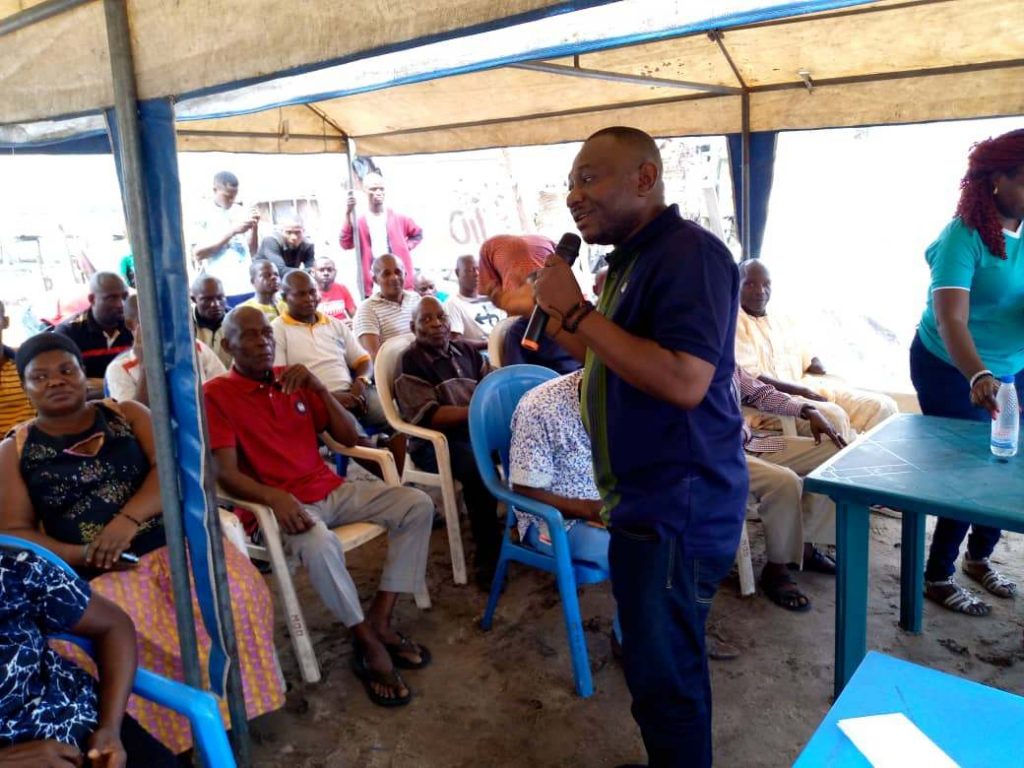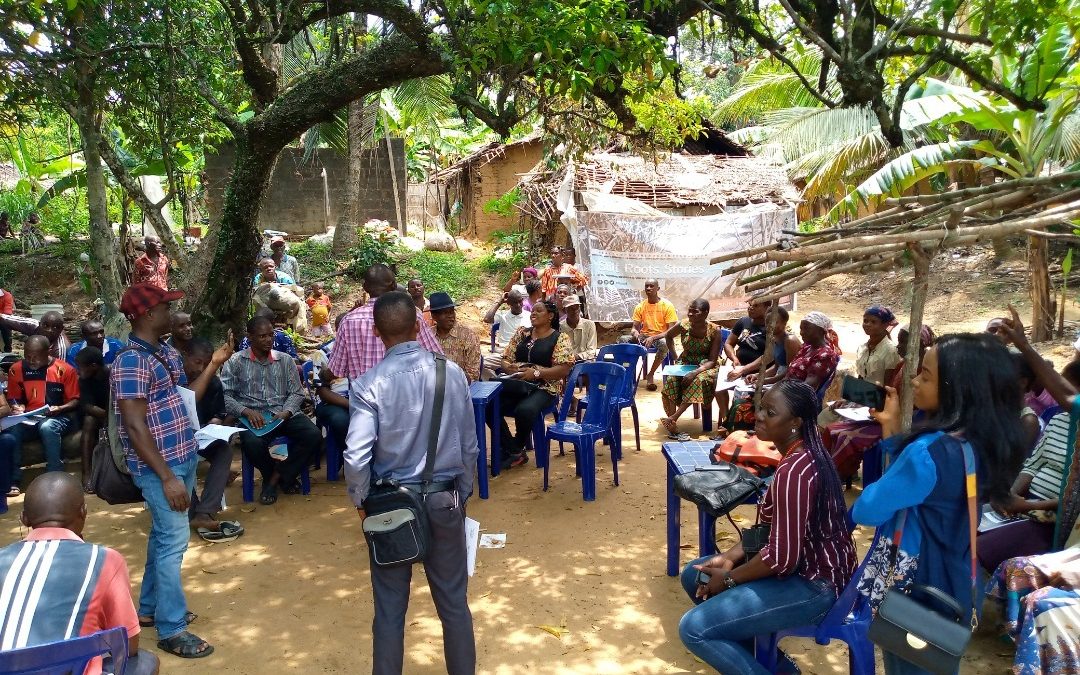It has been said that no one can tell a people’s story better than the people themselves. For six decades and counting, oil extraction activities have constantly degraded ecosystems – lands, rivers, mangroves, etc. in the Niger Delta with at least one oil spill occurring per day.
HOMEF held two Stilt Roots Community Dialogues to enable the affected communities share their stories, folklore and experiences about their mangroves and fishing activities, the pollution of their rivers by crude oil from pipelines and artisanal refining in the mangroves, livelihood, culture, energy issues and climate change. The dialogues were held at the waterfront of Kono and Bundu communities, Rivers State on 21 and 23 April 2021 respectively.
According to Nnimmo Bassey, HOMEF’s director, Stilt Roots Stories are the vehicle for leadership from below. They awaken communal memories, influence people’s perceptions, fire up their imagination and propel action. These stories provide opportunities for fishers and mangrove dependent communities to seek restoration of their ecosystems, revitalize and revalidate their socio-cultural systems and push for harmonious relationship with Mother Earth.
The following are some stories shared by members of degraded community environments at the Stilt Roots Community Dialogues.
Stilt Root Stories from Kono
Pollution has taken our livelihoods
“As a fisherman’s child in those days, my father used to take us on fishing expeditions. We often returned home with huge catches. We had enough to eat and sell. Today, things are different because of oil pollution and the nipa palm that has taken over all our mangroves and creeks. No more fishes, no more crabs and other aquatic animals. Our sources of livelihood are all gone.” – Richard Winikina.
No periwinkles anymore
“In the past, before the invasion of the nipa palm, we used to go into the coast to pickup periwinkles by the side and under the roots of the mangrove trees. Today, we hardly get anything to pick because the nipa palm has covered everywhere. This has caused hardship especially to the women who now have nothing to rely on as their sources of livelihoods. Things are becoming tougher by the day as the nipa palm keeps expanding.” – Deedum Menson (fisher woman/trader).
No fish menu for fishers
“Due to the hardship in our land, fathers no longer give fish to their children. Everything is sold for cash to meet other needs. Fishermen come home angry because there are no fish in the rivers anymore –their sources of livelihood which is fishing have been taken away by pollution. Even the women are no longer happy because their trade on fresh aquatic products are all gone. The situation in our community today is indeed a very sad one.” – Comfort Mark.
Saved by the Mangrove
There is a folktale we use to hear from our parents, of a baby that was saved by the mangrove. It is about two children from our community who were playing in the river. One of them pushed the other child into a deep part of the river and the wave carried the child away. The child that pushed the younger one into the river rushed home and reported to no one. As the waves carried the little child away, she got to a mangrove tree and held tight to the roots. As she gasped and struggled to stay afloat, she heard a fisherman cutting mangrove stems nearby. Her cries attracted the fisherman who came to her rescue. The moral of the story was that mangroves save lives.” – Constance Nna.
Halt harmful fishing methods
“Nipa palm has taken over our land, swamps and rivers. This is posing a big problem to fishers in the community. We go out daily to catch fish but at the end of the day come back empty hand. The methods of fishing using trawlers and chemicals as well as oil spills have also contributed to the reduction of fishes in our rivers. We want government to assist us in ensuring our environment is free from nipa palm invasion and that strict laws are made against harmful methods of fishing.”– Jim Nelson Ateketamuno Piri.
The tapper’s son
“Growing up as a child of a palm wine tapper was fun. We were always happy seeing my father return from tapping wine because he always came back with fresh fishes, crabs, periwinkles and mushrooms. It was always a dash for the hefted bag of goodies hung on the handles of his bicycle. Today, look at the raffia palm trees, the wine producing trees are all gone. Most of our mangroves that play host to fishes, periwinkles, crabs and other species have been destroyed.” – Celestine Akpobari.
Stilt Stories from Bundu
Extractive activities, shrunk fisheries and bad times
“In the past we used to get good fish catch even from within the community waterfront without launching deep into the rivers and seas. The situation is very different today. Fisheries have shrunk and things are so bad, we no longer get periwinkles and crabs from the mangroves. All these problems are due to the heavy presence of oil pollutions from extractive activities and from the activities of our boys who engage in illegal crude refining activities. Apart from pollution from crude oil, we experience soot….” – Nnadi Marcus, community leader/fisherman.
Bundu struggles
“I was part of those who joined the struggles of the Bundu people to resist the government from demolishing the waterfront community. The Bundu struggle for a clean and better environment has been on for a long time” Celestine Akpobari, human rights activist.
Sand filling (land reclamation) shrinking our rivers
“The issue of sand filling is a major problem affecting the people living here in Bundu and this is in turn affecting our fishes- as we sand fill our rivers, we drive the fishes far off into the deep waters. The sand filling is also destroying our mangroves and shrinking opportunities for our livelihoods.
In the past we fished around the shores of Bundu but now we can’t even get crabs from the shores of our rivers due to hydrocarbon pollution. To expect to have a good catch we have to move deep into the ocean. The situation is really terrible” – Godwin Siofori Berisuma, fisherman.
Plastic waste and modern technologies a threat to fishing
“One of the major threats and challenges we are having in our community today is the issue of plastic waste dumping into our rivers. This is driving away all our fishes and even when we throw our nets – instead of catching fishes we catch plastic bags and other plastics dumped into the rivers.
The other issue is that of pollution from oil companies and also from illegal refineries in the coastal communities.
In the past we used to enjoy fresh fish and sea foods but today we no longer have these foods. Back then when we go for fishing, after a good catch, we sing. One of such songs is that which when translated loosely means: ‘A chicken that cannot paddle a canoe cannot go to a market in the river’.
We want the government to come to our aid by cleaning up the plastics pollution and restoring our mangroves” – Prof (Fisherman) S.D Awajis.
Deep water fishing caused by pollution
“In the past we used to use about two yards of fishing nets to catch a lot of fishes from our community river, but today even when we use five yards of nets we don’t catch any fish. We have to go deep into the rivers/seas just to get a good catch but even at that our five yards of nets are not sufficient” – Snow Max Karibo, fisher women.
Broken fishing laws
“In the past community laws and traditions were in place to prevent people from fishing in certain parts of our rivers. Over time adherence to these cultural practices have weakened and they are often simply ignored. This is a sad situation. We need to revive those traditional rules” – Godwin Bereiweriso.
Look out for the June 2021 edition of the Eco-Instigator (No. 32) for a fuller version of the report on the Stilt Roots Community Dialogues.






